English literature V-18世纪英国文学
18世纪英国文学
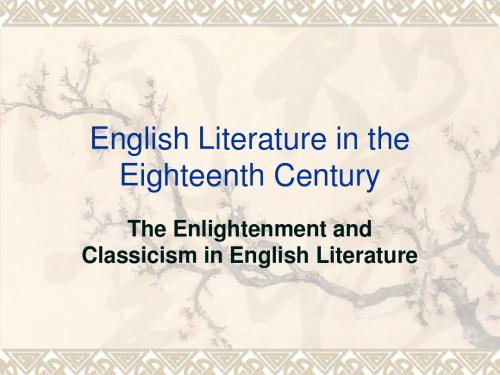
The neoclassicists have their artistic ideas: order, logic, symmetry, restraint, good taste, good sense, decorum and so on. In drama, they follow the three unities closely.
Prose should be precise, direct and flexible.
The 18th century is an age of Reason, an age of elegance and an age of classicism.
The
enlighteners celebrated reason or rationality, equality & science. They called for a reference to order, reason & rules & advocated universal education. Famous among the great enlighteners in England were those great writers like John Dryden, Alexander Pope & so on.
The English Enlighteners
The English enlighteners of the 18th century strove to bring it to an end by clearing away the feudal ideas with the bourgeois ideology.
英国文学 18th-Century Fiction
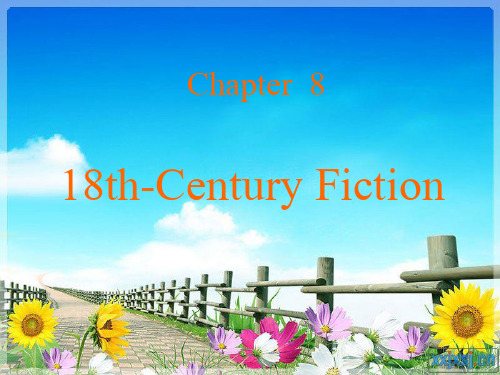
His major works
The Battle of the Books Tale of a Tub The Irish Drapier’s Letters A Modest Proposal Gulliver’s Travels
Gulliver’s Travels
The book consists of four books, each of which deals with one of the four voyages of Lemuel Gulliver, the protagonist, to the four remote and fantastic countries– Lilliput, Brobdingnag, Laputa, and Houyhnhnms--after he has met with shipwrecks, or pirates or other unfortunate happenings on the sea. Through the description of Gulliver’s adventures, Swift strips off the veil that covers the hypocrisy, injustice, crude vices of his society, to expose them all to the satire.
In the field of literature he became a dictator from whom even Alexander Pope had to take his cue at times as times as to what to write and who to attack. Swift has been seen by some people as the literary king of his day. Swift is probably the foremost prose satirist in the english language, and is less well known for his poetry.
TEM8 英语专八英美文学
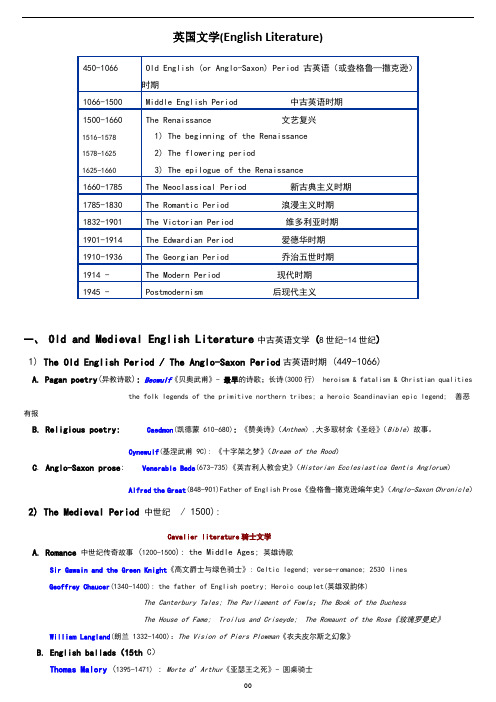
英国文学(English Literature)一、Old and Medieval English Literature中古英语文学(8世纪-14世纪)1) The Old English Period / The Anglo-Saxon Period古英语时期 (449-1066)A. Pagan poetry(异教诗歌): Beowulf《贝奥武甫》- 最早的诗歌;长诗(3000行) heroism & fatalism & Christian qualitiesthe folk legends of the primitive northern tribes; a heroic Scandinavian epic legend; 善恶有报B. Religious poetry:Caedmon(凯德蒙 610-680): 《赞美诗》(Anthem),大多取材余《圣经》(Bible)故事。
Cynewulf(基涅武甫 9C): 《十字架之梦》(Dream of the Rood)C. Anglo-Saxon prose: Venerable Bede(673-735)《英吉利人教会史》(Historian Ecclesiastica Gentis Anglorum)Alfred the Great(848-901)Father of English Prose《盎格鲁-撒克逊编年史》(Anglo-Saxon Chronicle)2) The Medieval Period中世纪 / 1500):Cavalier literature骑士文学A.Romance中世纪传奇故事 (1200-1500): the Middle Ages; 英雄诗歌Sir Gawain and the Green Knight《高文爵士与绿色骑士》: Celtic legend; verse-romance; 2530 linesGeoffrey Chaucer(1340-1400): the father of English poetry; Heroic couplet(英雄双韵体)The Canterbury Tales; The Parliament of Fowls;The Book of the DuchessThe House of Fame; Troilus and Criseyde; The Romaunt of the Rose《玫瑰罗曼史》William Langland(朗兰 1332-1400):The Vision of Piers Plowman《农夫皮尔斯之幻象》B.English ballads(15th C)Thomas Malory(1395-1471) :Morte d’Arthur《亚瑟王之死》- 圆桌骑士二、The Renaissance Period英国文艺复兴 (1500-1660):人文主义humanism; 十四行诗Sonnets; 无韵诗Blank verse; 戏剧Drama; 斯宾塞诗体Spenserian;University Wits 大学才子派1) 诗歌a. Thomas Wyatt(怀亚特1503-1542): the first to introduce the sonnet into English literatureb. Sir Philip Sidney(雪尼爵士 1554-1586):代表了当时的理想 - “the complete man”Defense of Poetry《为诗辩护》Astrophel and Stella《爱星者与星》;Arcadia《阿卡狄亚》: a prose romance filled with lyrics; a forerunner of the modern worldc. Edmund Spenser(斯宾塞1552-1599): the poets’ poetThe Shepherd Calendar《牧人日历》;Amoretti《爱情小唱》The Faerie Queen《仙后》:long poem for Queen Elizabeth; Allegory - nine-line verse stanza/ the Spenserian StanzaSpenserian Stanza(斯宾塞诗体): Nine lines, the first eight lines is in iambic(抑扬格) pentameter(五步诗),and the ninth line is an iambic hexameter(六步诗) line.2) 散文a. Thomas More(莫尔 1478-1535): 欧洲早期空想社会主义创始人Utopia《乌托邦》: More与海员的对话b. John Lyly (黎里 1553-160,散文家,剧作家&小说家):Eupheus《尤菲绮斯》Euphuism(夸饰文体): Abundant use of balanced sentences, alliterations(头韵) and other artificial prosodic(韵律) means.The use of odd similes(明喻) and comparisonsc. Francis Bacon (培根 1561-1626):Essays(论说文集):Of Studies, Of Love, Of Beauty: the first true English prose classicPhilosophical: New Instrument《新工具》New Atlantis《新大溪岛》Advancement of Learning《学术的推进》Professionals: Maxims of the Law《法律格言》3) 戏剧a. Christopher Marlowe: University Wits 大学才子派First made blank verse(无韵诗:不押韵的五步诗) the principle instrument of English dramaThe Jew of Malta《马耳他的犹太人》The Tragical History of Doctor Faustus《浮士德博士的悲剧》:根据德国民间故事书写成; 完善了无韵体诗。
【分析】18世纪英国文学特点分析
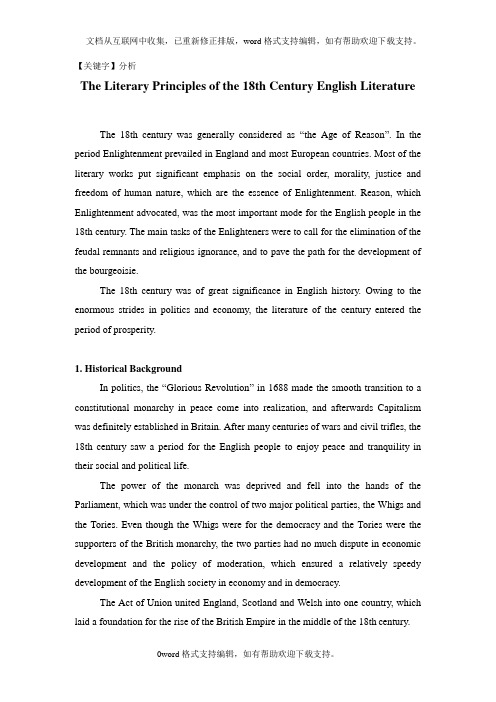
【关键字】分析The Literary Principles of the 18th Century English LiteratureThe 18th century was generally considered as “the Age of Reason”. In the period Enlightenment prevailed in England and most European countries. Most of the literary works put significant emphasis on the social order, morality, justice and freedom of human nature, which are the essence of Enlightenment. Reason, which Enlightenment advocated, was the most important mode for the English people in the 18th century. The main tasks of the Enlighteners were to call for the elimination of the feudal remnants and religious ignorance, and to pave the path for the development of the bourgeoisie.The 18th century was of great significance in English history. Owing to the enormous strides in politics and economy, the literature of the century entered the period of prosperity.1. Historical BackgroundIn politics, the “Glorious Revolution” in 1688 made the smooth transition to a constitutional monarchy in peace come into realization, and afterwards Capitalism was definitely established in Britain. After many centuries of wars and civil trifles, the 18th century saw a period for the English people to enjoy peace and tranquility in their social and political life.The power of the monarch was deprived and fell into the hands of the Parliament, which was under the control of two major political parties, the Whigs and the Tories. Even though the Whigs were for the democracy and the Tories were the supporters of the British monarchy, the two parties had no much dispute in economic development and the policy of moderation, which ensured a relatively speedy development of the English society in economy and in democracy.The Act of Union united England, Scotland and Welsh into one country, which laid a foundation for the rise of the British Empire in the middle of the 18th century.In economy, the international trading and the lucrative slave trade brought tremendous wealth. Although almost all the European countries had been on the process of industrialization, in England the development was accelerated with the help of the new inventions and a large-scale Enclosure Movement all over the country. The social status of the newly rising bourgeoisie was gradually set up by the boom of economy at home and abroad.However, the time the capitalists accumulated the enormous profits was the time thousands of peasants were expropriated off the land and the labor workers lost their jobs. The gap between the ruling class and the oppressed was aggravated. The social contradictions were accumulated and deteriorated.In social life, economic development also brought changes for the English people’s way of life. The people began to have more energy to participate in the social life. Such places for the social activities as the coffeehouse, the theaters and libraries gradually thrived. In the coffeehouse, information, opinions and even gossips on various issues were exchanged and the style of literature was formed and influenced in the public way.The economic prosperity and the rising of the bourgeois class produced a new requirement for a new social order and rules to meet the need of the social development in politics and morality, and the need of a way to clear away the feudal remnants. The literary men achieved the aim by means of the introduction of the reason, morality, and equality. The development of science and technology boosted the process. Isaac Newton exerted great influence upon Enlightenment with his law of gravitation, which smashed the medieval superstition to the natural forces.2. The Principles of LiteraryIt was impossible to make a clear distinction of the different literary genres with so many factors mixed together. Roughly, the literature in the 18th century was divided into three periods, from the late of the 17th century to the middle of the 18th century the popularity of the Neoclassicism, the early to the middle 18th century the rapid growth of the realistic novels of Defoe, and the outstanding novelists Fieldingand Smollett, and the last decades of the prevalence of Sentimentalism and the appearance of Romanticism.The literary trend of this century could be summarized as the development of poetry, the prosperity of prose, the rise of novel and the decline of drama.2.1 Enlightenment in LiteraryThe 18th century is known as “the Age of Enlightenment”, which is a progressive intellectual movement as a furtherance of the Renaissance of the 15th and 16th centuries. The Enlightenment left a lasting heritage for the 19th and 20th centuries.Enlightenment was not only a culture and thought movement, but has exerted huge influence on almost all of the aspects of the English people’s social life. The Enlighteners took the task to enlighten the people with the modern ideas in philosophy, politics and arts. The Enlighteners believed that the universe was rational and could be understood through Reason. Truth could be got through the empirical observation. And reason was the only yardstick to measure all human activities and relations. Only in this way can the primitive thoughts and feudal behaviors, such as superstition, injustice, oppression and religious persecution, be eliminated. The Enlighteners also fought against the social hierarchy system and called on the development of science and technology.Besides, they praised highly for the function of education. They held the belief that the universal education could bring about rationality, equality and truth. They believed that the human beings could be manipulated like the engine once they acquired these characteristics.In essence, the Enlightenment Movement was the struggle of the progressive bourgeoisie against Feudalism. For the bourgeois intellectuals, the Reason was the weapon to overthrow the domination of Feudalism. They sought the freedom of politics and academic thinking to pave the way for the establishment of the Capitalism.In brief, the Enlightenment movement was to enlighten or educate the peoplewith the modern philosophical and artistic ideas. Literature at the time showed the strong characteristics of didacticism and moralization. Among the famous Enlighteners in England, John Dryden and Alexander Pope were the most conspicuous.2.2 NeoclassicismThe influence of the Enlightenment Movement to the English literature of the 18th century was first reflected in the emergence and popularity of the Neoclassicism. Neoclassicism was a literature genre that came into being in the middle and late of the 17th century in England and France, and thrived in the beginning of the 18th century. John Dryden,though dead in 1700, was the first advocator and the most important performer.After the Renaissance, a reaction came against intricacy, boldness and extravagance. In the period, the literature brought about a revival of interest in the old Classical works. The writers got the ideas and art forms from the classical times. As John Dryden stated in his Essay of Dramatic Poesy, the Neoclassicists demanded that literature should learn from the Classical works of the ancient Greek and Roman writers and also their contemporary French writers, such as V oltaire and Diderot. The Neoclassicists advocated simplicity, restraint, regularity and good sense. They believed that accuracy and wits should be the most important elements in the art creation.The Neoclassicists formulated fixed rules and laws guided by Greek and Latin works for the genres of literature to follow. They believed that there was the proper language to choose and the right style and tone to use when they wrote different literature, which was the “correctness” that they pursued. Therefore, such standards of the Classics as drama, rhyme and good proportion were advocated. Under the guideline, poetry should be lyric, epic, didactic, or dramatic, and prose should be precise, direct, smooth and flexible.Meanwhile, the Neoclassicists argued that literature should be judged by the function of moralization and education. Therefore, most of the literature during thatperiod was didactic so as to form a new social order and morality to meet the needs of the new era.What’s more, another aim of the literature was to entertain the readers. With the boom of the publishing industry and the increase of the educated population, new ways to entertain the mass, especially the people of the middle class, were called on. The expectation of the people to participate in social activities and express their emotions grew stronger. Hence, the simple, elegant and restraint writing styles gained popularity.Furthermore, the writings of Neoclassicism shared a common feature—objectivity. As the neoclassicists emphasized Reason and thought that art should be logically organized, neoclassical art did not appreciate the emotion or imagination, but logic, good organization and proportion. However, literature under this guideline seemed a bit cold and inhumane. The absence of any elements of romantic and the over emphasis on Reason led to the rise of the opposite genr e—Romanticism in the period followed.However, literature at that period was not simply the imitation of the Classics but something new was injected into it. Dryden, the advocator of the Movement, laid emphasis not only on Neoclassicism, but also on the traditional English literature. He praised the works of Shakespeare’s and Chaucer’s, and encouraged the combination of the classics with the native elements of England to make the writing style new. Dryden’s theory was modern and flexible, so it was easy to be accepted and promoted by his followers in the 18th century, such as Alexander Pope and Swift. The idea promoted the popularity of the English literature, especially the first half of the 18th century.With the influence of Neoclassicism, the prose was developed dramatically. A lot of prose writers and novelists appeared, like Addison, Daniel Defoe, Henry Fielding and Samuel Richardson.Even though the Neoclassicism did not flourish very long in the history of English literature and was substituted by the Sentimentalism and Romanticism. The ideas of reason, wit, simplicity and regularity existed and influenced the Englishliterature even to the modern times.2.3 The Origin of the English NovelThe 18th century was the golden age of the novel. The origin of the novel can date back to Homer’s epic, the legend in the medieval times of Europe and the adventure stories in Europe. However, in English literature, the novel, the new genre, emerged and the realistic novels reached the peak in the 18th century. Many great novelists, such as Defoe, Swift, Richardson, Fielding and Smollett, were not only world famous, but has left a great cultural heritage.In the 18th century, the rapid growth of economy boomed the city life. The middle class had more leisure time to entertain themselves. They called for fresh ways of entertainment and expressions of their thoughts and emotions. In the new social system, the patronage, which used to be the main means for the writers to get subsidization, was substituted by the new system of publishing and copyright. The writers had more freedom to write what they wanted to and some of them wrote to cater to the popular taste. At the same time, a new and great need for the reading emerged. Libraries stepped into the people’s daily life, so that more and more prints were called for in the huge market. They were all the reasons to promote the originality and development of English novels, especially the rise and the prosperity of the realistic novels in the 1730s to 40s.2.3.1 The Realistic NovelIn the first half of the 18th century, “reality”became the most important conception of the creation of novels. Novels were not only the means for the writers to reflect their life and feelings but also the way for the common people to express their passion and emotions.In the process of elevating their social status and accumulating the wealth, the bourgeois fought with the old system and had endured the hardships. The whole meaning of their life was to work hard, to make wealth and to get a better life. What was realistic in the true life was represented faithfully in the realistic novels of thecentury.The feature was best found in Robinson Crusoe, Denial Defoe’s masterpiece. Denial Defoe was named the “father of English realistic novel” by some scholars not only because Robinson Crusoe was the first realistic novel in the 18th century and the first modern English novel, but also it was a good example of the “truth to life”.In the novel, the writer gave the reader a vivid description of the spirit of struggle and adventure at the beginning of the Capitalism, and successfully portrayed an image of an enterprising Englishman. The realistic presentation of the growth and struggle of Robinson showed the spirit of that time. Robinson, as a businessman who pursued wealth, was a typical representative of the English middle-class men with courage, energy, persistence and wisdom. His struggle against the hostile natural environment showed the strong confidence of the bourgeoisie to fight for the ambitions. Robinson grew from a naive youth full of dreams into a realistic and hardened man, tempered by numerous trials in his eventful life.Besides, Robinson was also the representative of the bourgeois colonizers who took control of the new land and his servant, Friday. Therefore, this novel was the product of the Industrial Revolution and a real presentation of life of the common people.Generally, the writers of the realistic novels would claim that what they had written was really based on the true events with the real place names and the exact date as the background. At the beginning of Robinson Crusoe, “he” said, “I was born in the Year 1632, in the City of York, of a good Family, though not of that country, my father being a foreigner of Bremen who settled first at Hull.” And later the description of his life in Brazil as a planter conformed to the historical facts at that time. In the novel, the colloquial, easy language and sometimes, short, plain sentences were used to leave the readers the impression that the hero was true to life and was telling his stories face to face. In the narrative, the writers put an emphasis on the detailed account of the process and the description of the mental activity. In Robinson Crusoe, the vivid description of the details made the story fascinating. However, this novel was criticized for the repetition and the loose structure.Besides, even though the themes of the realistic novels were different, they had the same core, which was the searching for the essence of life. Through the account of the living conditions and the way of living at that period, the writers sought the answers from the common people, and even the vulgar and the poor, which was contrary to the traditional romance of aristocrats or epics. Through Robinson, who lived alone in an isolated island, and Tom Jones, an outcast in Henry Fielding’s masterpiece The life and History of the Foundling Tom Jones, the writers, against the mode of the Neoclassicism, expounded that the courage, the wisdom, the persistence and the morality of the mass people were the primitive power for the social progress.To summarize, the realistic novels, for the first time turning their attention from the grand themes and the high classes to the common people and the reality, adding the modern element to the writing style of that period. That is why Robinson Crusoe was taken as the forerunner of the modern novel.Besides Daniel Defoe, Henry Fielding and Tobias Smollett made even higher achievement. Their works had impact on some of the great works of European writers, and paved the way for the great 19th century realistic writers like Jane Austen, Walter Scott, Charles Dickens and William M. Thackeray.2.3.2 The Epistolary NovelIn the 18th century, another style emerged and brought in a new way of narrative, which is the epistolary novel. Samuel Richardson flourished the style by three famous works Pamela, Clarissa and Grandson.The novel Pamela was written in the form of a series of letters from the heroine to her parents. In the letters she told them her life and experience at her master’s house. The epistolary novels not only enriched the narrative form of the novel, but also transformed the role of the writers from the narrator to the editor. By means of the pile of letters, the heroine herself told the story. In the epistolary novel, the characters would get closer to the reader. The mental activities and the change of their emotions could be more vivid. It was easy to get the readers to resonate deeply with the fate of the heroine. Pamela was among the first novels to give detailed descriptionof the character’s psychology. It described not only the common life of the characters, but through the letters their inner thoughts and feelings. Therefore, this novel was also considered as the first psycho-analytic novel in the history of English literature. The vivid description of the psychology of the females gave an impetus to the development of the modern novels. From this perspective, Richardson was thought of the real founder of English modern novels by some scholars.The subtitle of the novel was Virtue Rewarded, the function of moral instruction and education was clearly showed in the novel beside that of entertainment.2.3.3 The Gothic NovelIn the last decades of the 18th century, the English realistic novel gradually gave way to the Gothic novel or the Gothic romance.The Gothic novel refers to the strange, mysterious adventures happening in dark and lonely places such as graveyards and old castles built in the middle ages, such as the Gothic castle. The Gothic novel originated from Horace Walpole’s novel The Castle of Otranto in 1764. As a branch of the English literature, the Gothic novels played an important role in the development of the horror movies and left great influence upon the English romanticists.Generally speaking, the Gothic novels included such elements as horror, mystery, supernature, and death. Usually the story would be set in the classic castles with haunted ghosts. The typical story focused on the sufferings or mystery imposed on an innocent heroine. Frequent use was made of ghosts, mysterious disappearances, sensational and supernatural occurrences. The principal aim of such novels was to evoke chilling terror by exploiting mystery and a variety of horrors.2.4 The Satire StyleSatire,another typical feature of this period’s writing, prevailed in the first half of the 18th century. A common feature of satire was to use strong irony or sarcasm, usually in parody, exaggeration and comparison, to attack something they did not accept or approve of. Not only was satire an effective weapon for arguments of allkinds and attacks on the political views, the social system and social life, but also it answered well the purpose of the Enlightenment, aiming at universal education to perfect the mass in moral, social as well as cultural life.In the 18th century, satire prevailed at a certain historical background. Even though this was a relatively peaceful period in English history, various divergences of values and conflicts still existed. With the increase of the wealth, the bourgeoisie expected to have higher social status and more power to control the nation, which was to turn over the social hierarchy and social custom. The contradictions between the two parties increased the social unrest. Among them the contradictions between the ruling class and the laboring poor were gradually intensified. The industrial Revolution and foreign trade brought a large quantity of wealth to the country, but that did not spread to the mass of the poor people. Correspondingly, social problems and discontent were constantly emerging. The social reality was reflected in the literary works in a satirical style.Pope and Swift were the superb satirists during that period. Swift defined a good style as “proper words in proper places”. Their satires are well-known for witty remarks and adept techniques. So satire became the fashion and was performed almost in all forms of writing at the time.Jonathan Swift not only was one of the greatest representatives of the genre, but also was thought of the first writer to perform the modern satire. Even though he advocated Reason, he sometimes held certain skepticism to the “universal Reason”. He was well-known for his meaningful wording and the diversified writing techniques in his satiric novels.In A Modest Proposal, the writer suggested a seemingly logical proposal for the Irish slum, only to mock the heartlessness and selfishness of the high classes as well as their inhumane Irish policy in general. This essay has been regarded as the most ridiculous and savage ironical satire.In Gulliver’s Travels, the writer used fancy to make up an imaginary social condition, by using imaginary plots and exaggerated techniques to satirize and attack the social system and the politics. The book seemed to be an allegorical story forchildren, but in it the vanity and hypocrisy of the contemporary courts, statesmen and political parties were satirically attacked. In the first two parts of the novel, the writer mocked the conflicts between the parities, the Whigs and the Tories. In the part of the Flying Island, the writer described the strange and useless experiments that the scientists did, through which Swift satirized that the science was far away from the practical life.Henry Fielding’s works showed a grand panorama of life of the 18th century English society through the realistic description of the details. In his works, the characters were true-to-life, and full of optimism. Yet he also mildly criticized the weakness of the human nature and the vulgar social customs. His works Joseph Andrews was at first written to ridicule Richardson’s Pamela for its utilitarian morality, but made a big success unexpectedly. He claimed that this novel was “a comic epic poem in prose”in the preface of Joseph Andrews. However, different from the traditional epic, which is a genre generally used to praise heroes, nobles or kings, Fielding took advantage of the conception but portrayed the heroes of the middle or low classes so as to produce the ironic effect.Fielding’s Jonathan Wild the Great is a bitter satire on the exploiting and oppressing class. It is one of the best exposures of the corruption of the English bourgeois-aristocratic society. The “great”in the title referred not only to the hero “Jonathan Wild”, but also the minster “Robert Walpole” and other “great” men in the ruling class. From these men, Fielding summarized a common virtue “greatness” from their true nature of tyranny, corruption, oppression and exploitation to others.The Life and the History of Tom Jones, a Foundling, as Fielding’s masterpiece, was another good example. The story, through the growth of a foundling, Tom Jones, touched upon all kinds of people as well as the social problems. The novel was about a young man and a young woman who tried to unravel their birth myth, and their love story. In the process of their looking for their birth, Fielding gave the readers an extensive view of the social life in the city and the town. Through the comparison of different characters they met, the writer severely criticized the corruption, greed and hypocrisy of the nobles at that period. Fielding contributed a lot to the advance of theEnglish and European novels.2.5 SentimentalismSentimentalism was a trend of thought beginning in the 1740s and 50s. Its name was gained from Laurence Stern’s A Sentimental Journey through France and Italy (1768). By the middle of the 18th century, sentimentalism came into being due to the discontent with the social reality.In the middle of the century, the contradictions were intensified to the degree that the nation was faced with the threat of instability. The Enlighteners, such as, Fielding and Smollett, who at first had sufficient faith in the eventual triumph of virtue and the final achievement of social justice, began to be skeptical about the eternal “truth” and Reason, which were preached by the bourgeoisie.Even though the people began to doubt the power of the Reason to solve the social problems, they could not find out a more positive way to make the society better. The decline of the great Enlightenment brought about sentimentalism and pre-romanticism as the protest against the social reality of the day. Sentimentalism was an outlet for their dissatisfaction to the reality and for the escape from the far-from-perfect reality. Sentimentalism was the forerunner of the Romanticism later prevailing in the European literature.Form the angle of the ideology, sentimentalism was against the classicism and the rationalism. It was totally opposite to the perspective of the rationalism that the individuals should be under the control of the sovereignty. Sentimentalism stressed the expression of the emotions and feelings of the individual in the daily life. It concentrated on the distress of the poor and the virtuous people. It revealed grief, pains and tears. The emotions were mainly melancholy, sentimental and sensitive.Leslie Stephen once argued, “Sentimentalism could be defined to be indulgence in emotion for its own sake. The sentimentalist does not weep because painful thoughts are forced upon him but because he finds weeping pleasant in itself (p160).”In sentimental works, the first characteristics is that the characters’ mood and miserable life were portrayed to arouse readers’ sympathy to the ordinary people and discontent towards the social reality. The appeal to sentiment, not Reason, was themain characteristics. Sentimentalists thought that Reason was only a cold rule or law to tell the people the code of conduct. In their views, human beings were born good and were endowed with compassion, kindness and morality. Hence, the function of literature was to awaken and motivate the potential.The writers usually made use of death, loneliness and miserable experience to make the atmosphere desolate, dark and melancholy. In this way, the readers were easy to move and full of sympathy to the character. At the beginning of the century, almost all the works, as poetry, novels and essays were rational, ironic and instructive. Sentimentalism totally changed the direction of English literature. At the same time, the educational function was also fulfilled.Besides, the common people molded in the works made the readers feel real empathy for what the characters had been through. And the sympathy for the misery of others became a sign of good manners and social morality.What’s more, in the views of the sentimentalists, there was no distinction of the genres of literature, that is, elegance or vulgarity. Therefore, a lot of different literature styles, such as prose, lyric, letter, autobiography, became the common styles in sentimentalism.Sentimentalism, having obtained pleasure in nature and the mysterious, paved the way for Romanticism, which put high value on nature and spontaneous expression of emotion. In addition, romanticists’ praise for the virtue of the common people and the attack on the rich and the system owed a good deal to sentimentalism.The most outstanding figure of English sentimentalists are Laurence Sterne who wrote A Sentimental Journey through France and Italy in 1768 and Thomas Gray with his masterpiece, Elegy Written in a Country Churchyard, the model of sentimental poetry.Sentimentalism in poetry first found its full expression in the 40s and the 50s and was the bridge from Classicism to Romanticism. In Thomas Gray’s Elegy Written in a Country Churchyard, the poem reflected the poet’s melancholy on the death and the sorrowful life of human beings. The poet also pointed out that death was inevitable no matter who you were. This poem, with the well-balanced structure and。
English literature V-18世纪英国文学
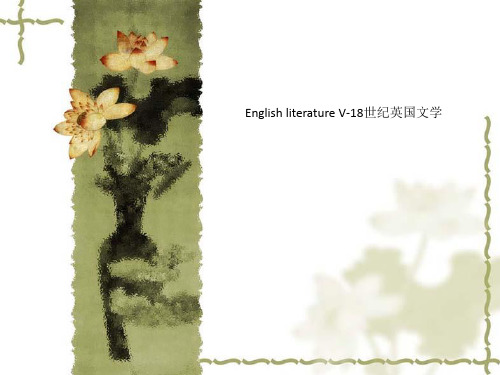
British Empire
Mongol Empire
Eurasia on the eve of the Mongol invasions, c. 1200.
Historical Background
❖ The "Glorious Revolution" of 1688 ended in a compromise between the aristocracy and bourgeoisie. England became a constitutional monarchy and power passed from the King to the Parliament and the cabinet ministers.
sustained growth.
Industrial Revolution
❖ The application of steam power to the industrial processes of printing supported a massive expansion of newspaper and popular book publishing, which reinforced rising literacy and demands for mass political participation.
❖ During the Industrial Revolution an intellectual and artistic hostility towards the new industrialization developed. This was known as the Romantic movement.
❖ The movement stressed the importance of "nature" in art and language, in contrast to "monstrous" machines and factories.
18世纪英国文学(一)

Chapter 2 Alexander Pope(蒲伯)
• Alexander Pope (1688-1744) was the most important English poet in the first half of the 18th century.
Life
• The boy was precluded from formal education by his Roman Catholicism, Pope was mainly self-educated. • A deformity of the spine and other health problems limited his growth and physical activities, leading him to devote himself to reading and writing. • At 12, he was able to compose dramatic poems; at 16, he wrote his ―Pastorals―(田园诗); and when he was only 22, his poem ‖Essay on Criticism‖(批评论) was published, and from then on he was looked up to as a great master of verse in England and in Europe.
2. Classicism
• An attitude to literature or a movement that is guided by admiration of the qualities of formal balance, proportion, decorum端庄 得体, and restraint适度 attributed to the major works of ancient Greek and Roman literature (‗the classics‘)
18世纪的英国文学

❖Gulliver’s Travels records the pretended four voyages of Gulliver, and his adventures in four strange countries.
❖A Modest Proposal is a more bitter satire on the policy of the English government towards the Irish people.
the guiding principle or slogan is Ration/Reason, natural right and equality
Ration became standard for measurement of everything.
The Enlightenment Movement
❖ 2.The rise of English novel: an important phenomenon of the period.
❖ 3. Gothic novels emerged and flourished in the last decade of the 17th century, which combine both elements of horror and romance.
18世纪英国文学发展
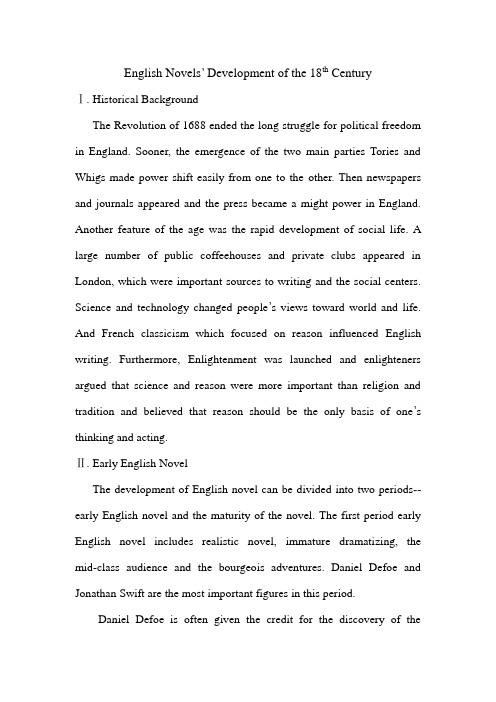
English Novels’ Development of the 18th CenturyⅠ.Historical BackgroundThe Revolution of 1688 ended the long struggle for political freedom in England. Sooner, the emergence of the two main parties Tories and Whigs made power shift easily from one to the other. Then newspapers and journals appeared and the press became a might power in England. Another feature of the age was the rapid development of social life. A large number of public coffeehouses and private clubs appeared in London, which were important sources to writing and the social centers. Science and technology changed people’s views toward world and life. And French classicism which focused on reason influenced English writing. Furthermore, Enlightenment was launched and enlighteners argued that science and reason were more important than religion and tradition and believed that reason should be the only basis of one’s thinking and acting.Ⅱ.Early English NovelThe development of English novel can be divided into two periods-- early English novel and the maturity of the novel. The first period early English novel includes realistic novel, immature dramatizing, the mid-class audience and the bourgeois adventures. Daniel Defoe and Jonathan Swift are the most important figures in this period.Daniel Defoe is often given the credit for the discovery of themodern novel. His book Robinson Crusoe, showing an exciting tale with simple and brief words, is one of the forerunners of the English 18th century realistic novel.In Jonathan Swift’s world famous novel Gulliver’s Travels, he typified the bourgeois world, drew ruthless pictures of the depraved aristocracy and satirically, portrayed the whole of the English state system. This novel is regarded as one of the greatest satires in England. Ⅲ.The Maturity of the NovelThe second period is the maturity of the novel which includes sentimental novel, realistic novel and pre-romantic novel.Samuel Richardson and Laurence Sterne are outstanding figures of English Sentimentalism. Samuel Richardson’s Pamela, or Virtue Rewarded and Clarissa, or the History of a Young Lady are epistolary novels, which enriched European literature with the method of Psychological analysis. Laurence Sterne’s Tristram Shandy and Sentimental Journey reveal a purely emotional approach to life on the part of the narrator.Realistic novels show things and people as they are in real life. Henry Fielding and Tobias Smollet are the founders of the genre of the bourgeois realistic novel in England. In Henry Fielding’s novel The History of Tom Jones, a Foundling, he invariably put such characters in position which tear away their masks. Tobias Smollet touched uponvarious aspects of English life in his satirical novels.Pre-romantic novel described romantic adventures in mysterious or frightening surroundings, which can also be called Gothic novel. It is the origin of horrible novel.ⅠV. ConclusionAlthough England’s chief achievement is in the fields of drama and poetry, England’s novel strongly influenced the development of English literature, especially in the 18th century. In this period, many outstanding figures emerged with a large number of excellent and famous books which are very familiar to all of us. For example, Robinson Crusoe showed an image of an enterprising Englishmen, which left a deep impression. These novelists and their famous works have contributed much to the literature of England and Europe and even the whole world.。
- 1、下载文档前请自行甄别文档内容的完整性,平台不提供额外的编辑、内容补充、找答案等附加服务。
- 2、"仅部分预览"的文档,不可在线预览部分如存在完整性等问题,可反馈申请退款(可完整预览的文档不适用该条件!)。
- 3、如文档侵犯您的权益,请联系客服反馈,我们会尽快为您处理(人工客服工作时间:9:00-18:30)。
Whigs and Tories
❖ The two main parties were so well balanced that a few votes could overturn a cabinet. So the press became a mighty power in England, and any writer with a talent for argument or satire was almost certain to be hired by party leaders.
❖ Envious of the great wealth these empires generated, England, France, and the Netherlands, began to establish colonies and trade networks of their own in the Americas and Asia. A series of wars in the 17th and 18th centuries with the Netherlands and France left England the dominant colonial power in North America and India.
❖ no royal interference of parliament.
❖ Roman Catholics shall not inherit the throne of England.
❖ This led, ultimately, to the establishment of constitutional monarchy. The King George I wasn’t all that interested in English politics and he went to hometown for as long as he could, then Parliament could govern the country without him. So they did.
English literature V-18世纪英国文学
British Empire
❖ During the Age of Discovery in the 15th and 16th centuries, Portugal and Spain pioneered European exploration ss established large overseas empires.
Whigs and Tories
❖ The Glorious Revolution and the Bill of Rights were a good start. As the Bill mainly said:
❖ no royal interference with the law. ❖ no taxation by Royal Prerogative. ❖ no standing army may be maintained during a time of
❖ Whigs(辉格党, 19世纪中叶演变为英国自由党) :determined to safeguard popular liberty.
❖ Tories(托利党,1833年改称保守党):would leave as much authority as possible in the royal hands. many Tories secretly wanted to bring the Stuarts back.
British Empire
❖ At its height, it was the largest empire in history and, for over a century, was the foremost global power. By 1922 the British Empire held sway over about 458 million people, one-fifth of the world‘s population at the time. The empire covered more than 33,700,000 km2, almost a quarter of the Earth's total land area. At the peak of its power, the phrase "the empire on which the sun never sets" was often used to describe the British Empire.
British Empire
Mongol Empire
Eurasia on the eve of the Mongol invasions, c. 1200.
Historical Background
❖ The "Glorious Revolution" of 1688 ended in a compromise between the aristocracy and bourgeoisie. England became a constitutional monarchy and power passed from the King to the Parliament and the cabinet ministers.
Whigs and Tories
❖ No sooner were the people in control of the government than they divided into hostile parties: the liberal Whigs and the conservative Tories.
peace without the consent of parliament. ❖ no royal interference in the freedom of the people to
have arms for their own defense.
the Bill of Rights (1689年权利法令)
